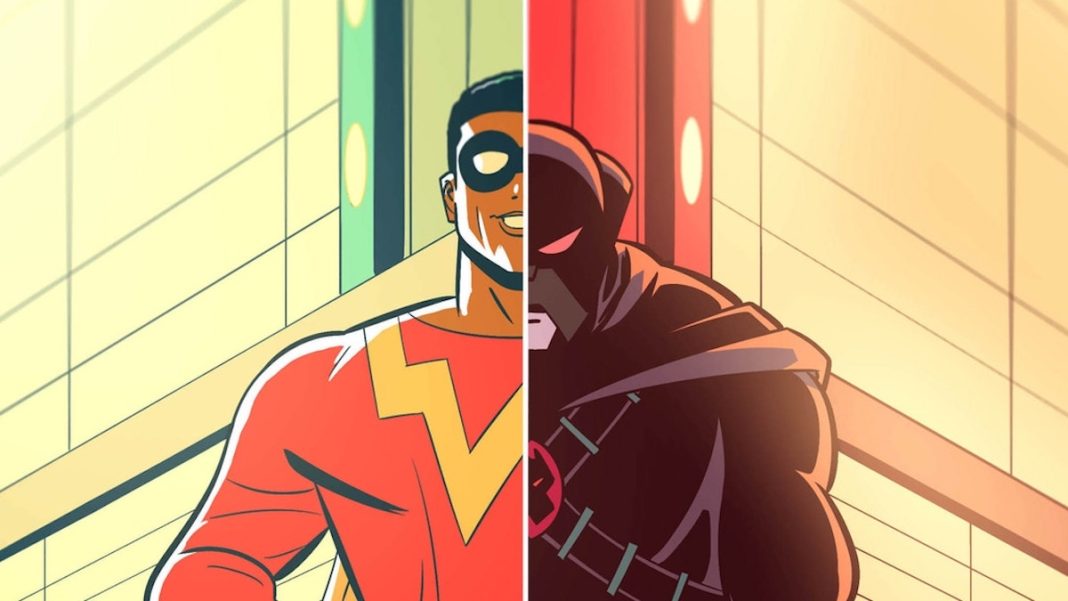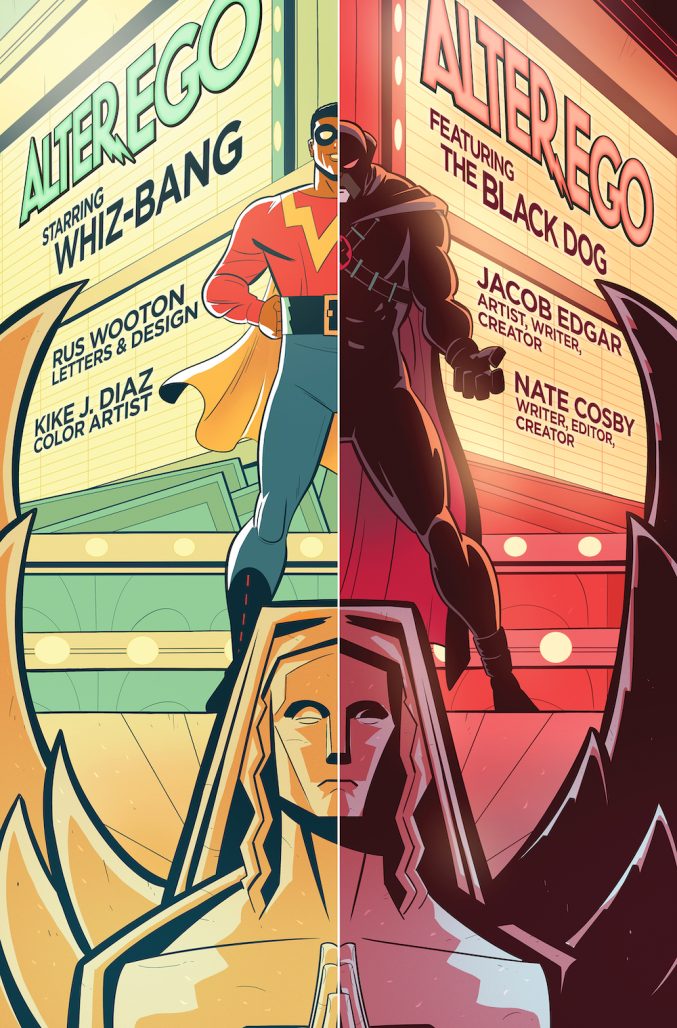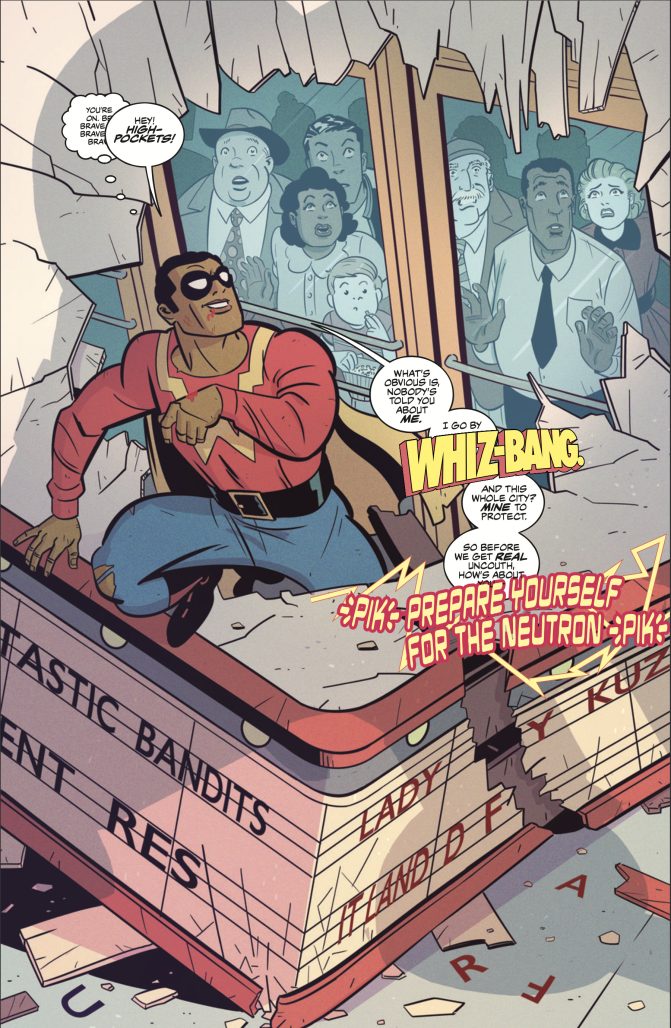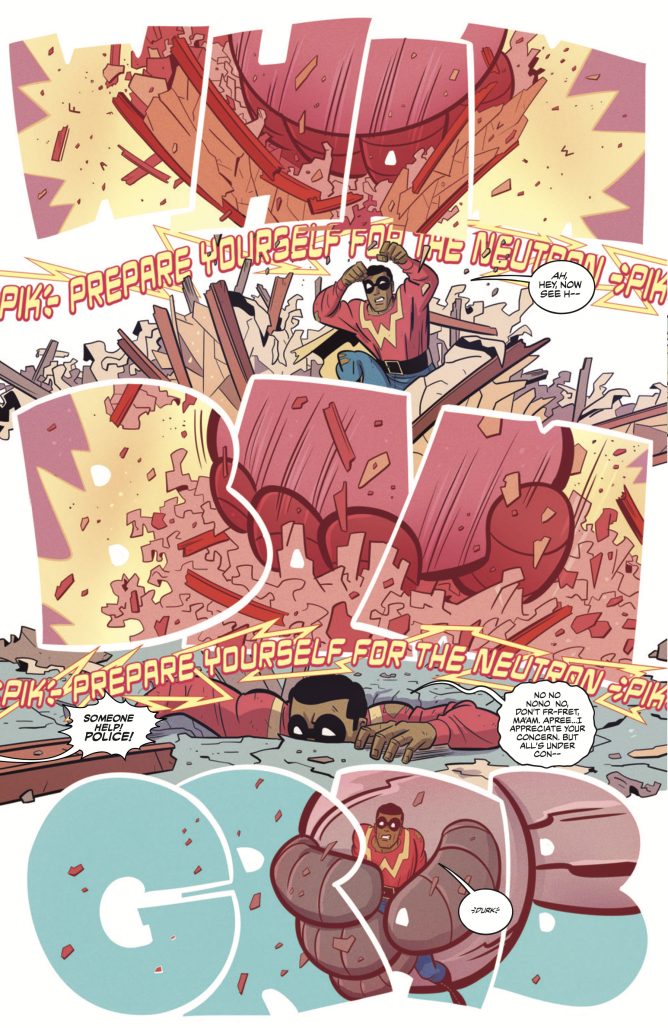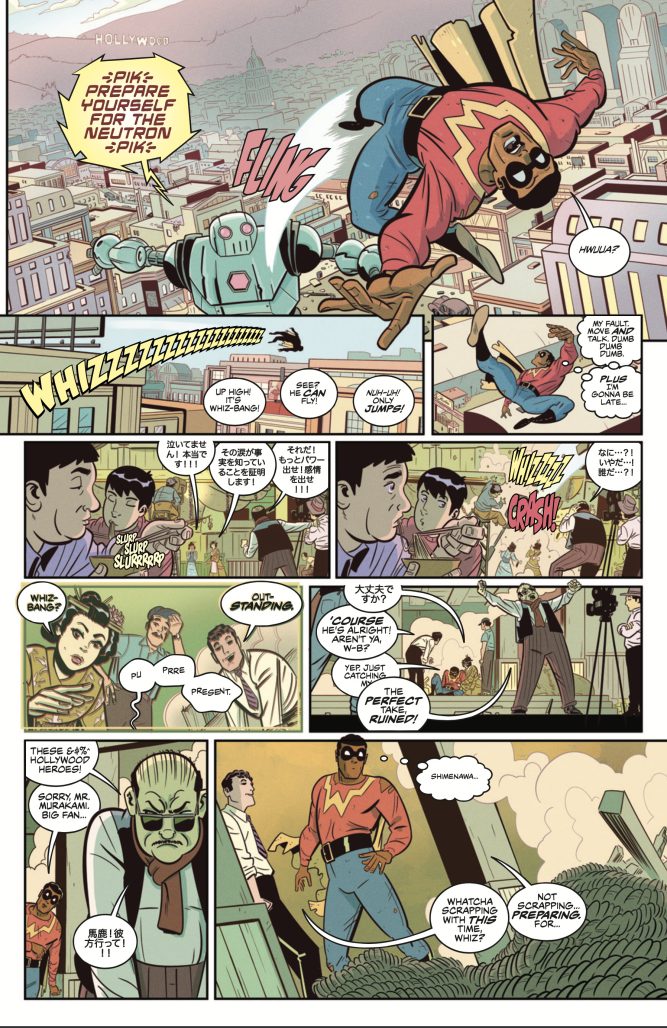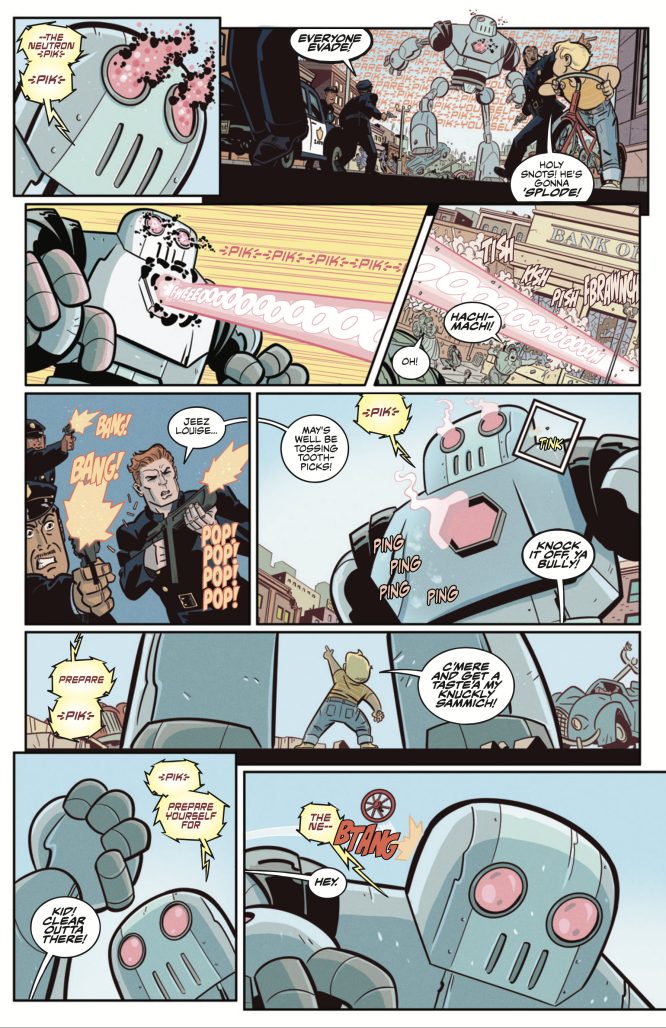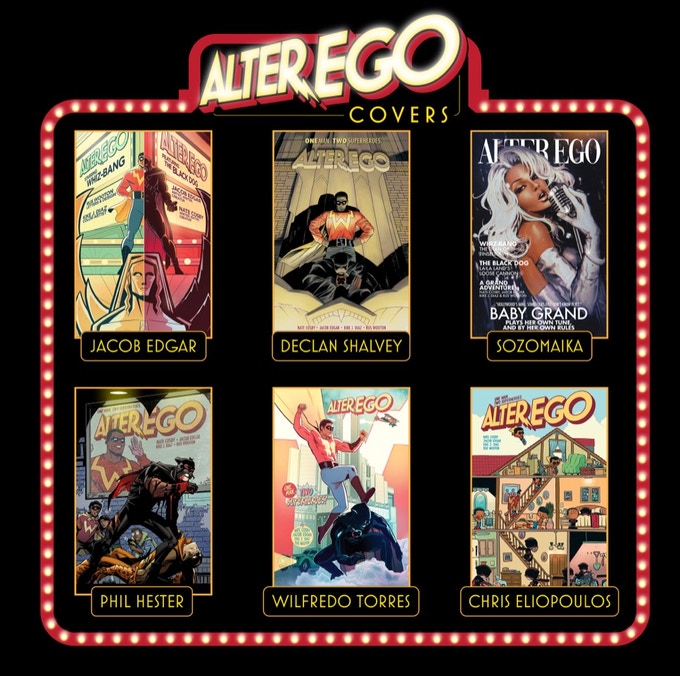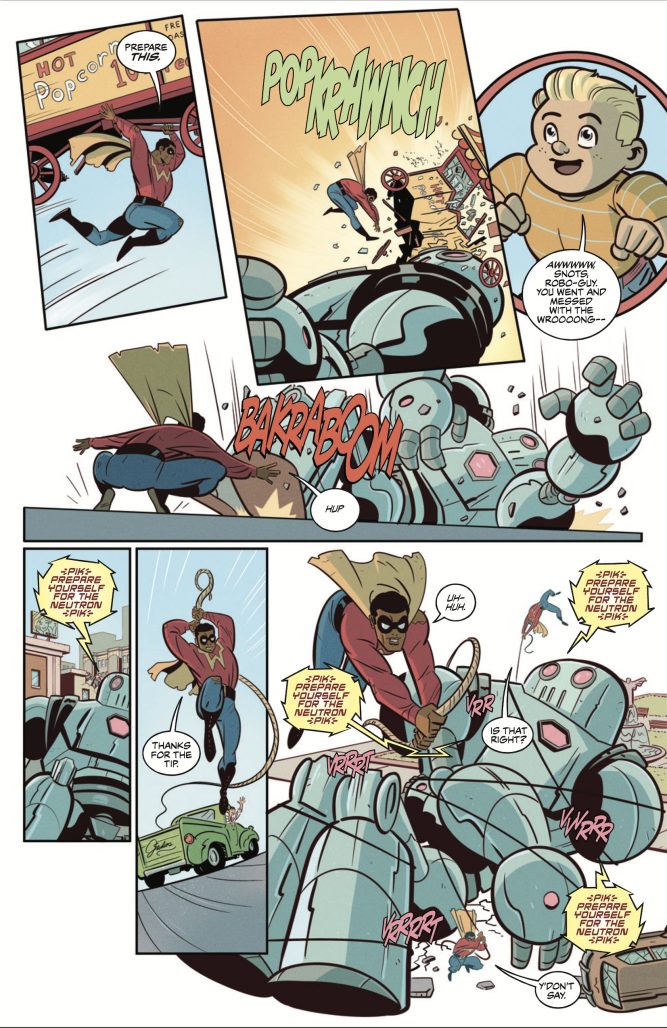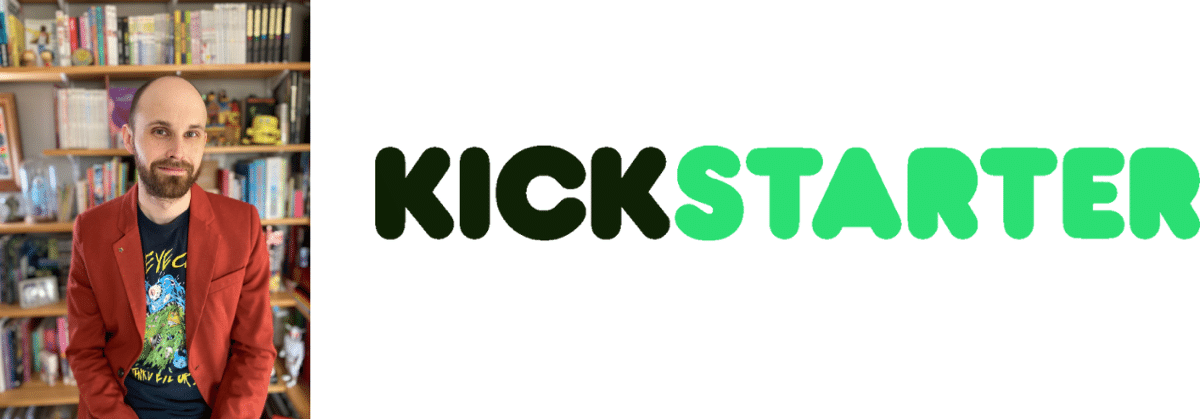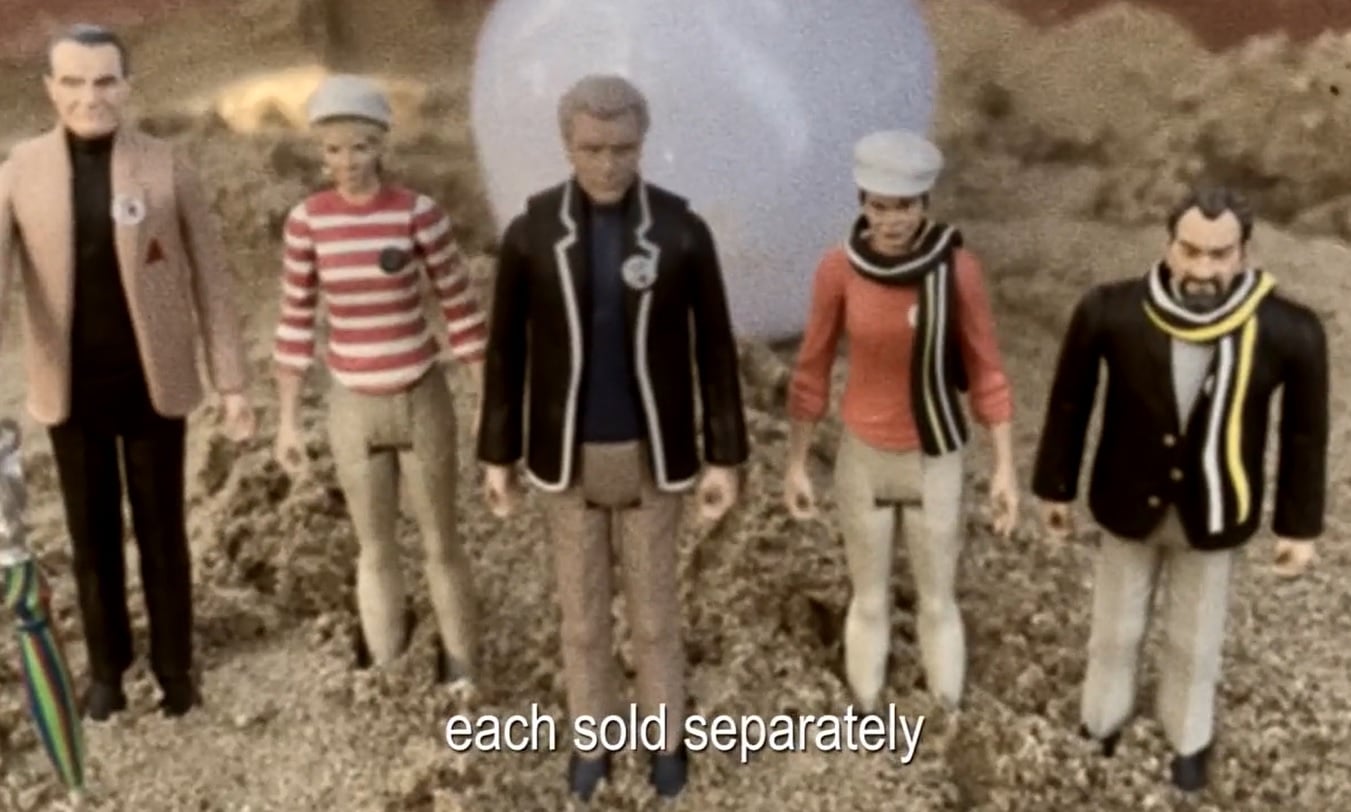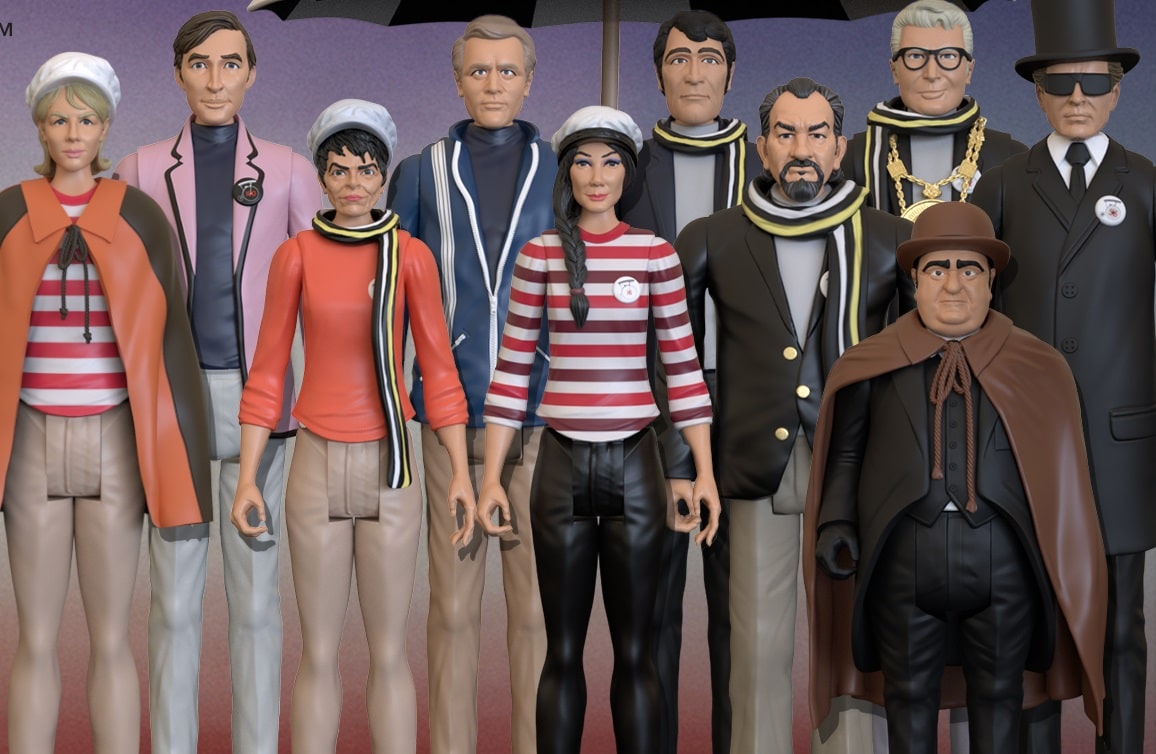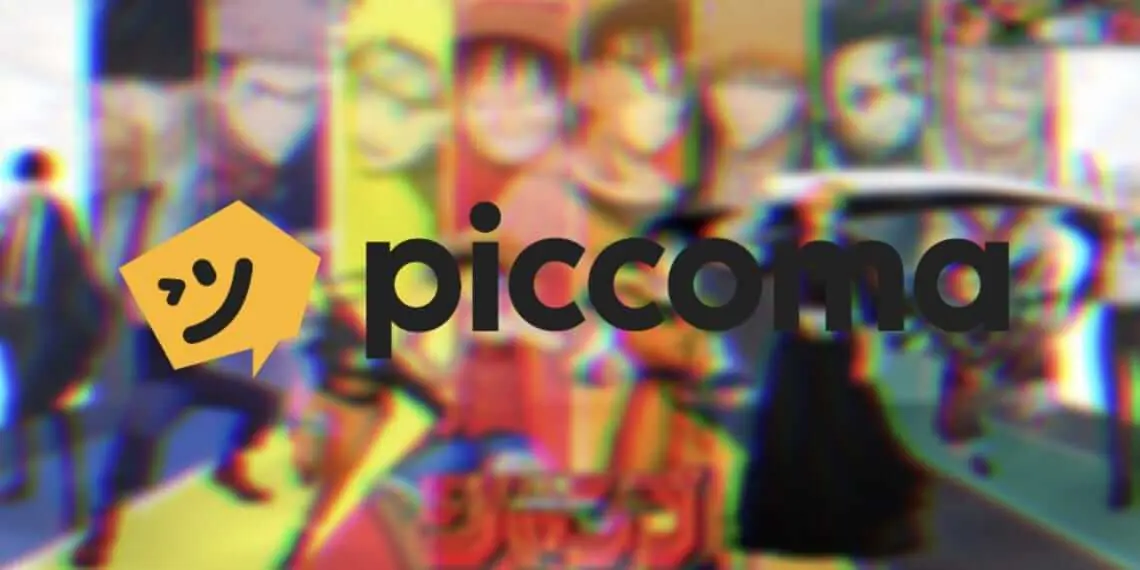“What if one person was two superheroes?” That’s the tagline for Alter Ego, the new graphic novel from writer Nate Cosby, artist Jacob Edgar, color artist Kike J. Diaz, and letterer Rus Wooton. The book, currently being funded via a Kickstarter campaign, follows Ace Adams, stuntman of a 1940s Hollywood where super-villains are as common as superstars, as he fights crime by day as Whiz-Bang and at night as The Black Dog.
Alter Ego is the latest project from Nate Cosby, who is known in the comics world both as a writer and an editor for numerous publishers. The Beat sat down with Cosby to discuss the genesis of Alter Ego, bringing the project to Kickstarter, and creating an alternate-universe Hollywood.
Joe Grunenwald: Where did the idea of one man being two superheroes stem from? How does being two superheroes compare to, say, having two jobs?
Nate Cosby: I hadn’t worked on superhero stories for a few years, and wasn’t really looking to do so. But this idea just kept bouncing around in my head, about a person that wanted to help people, so much so that he was compelled to throw on a bright costume and fight villains in the light of day, for all to see. But then I thought, what if that wasn’t enough? What if the person realized that there’s other crimes that need to be fought differently, and not in a way that everyone should witness? I thought, maybe they’d create another persona, one that prowls the night, tiptoeing up to moral lines in ways he’d never considered, all because he’s fighting for the “greater good.”
I approached the idea of one guy being two heroes as “the roles of a lifetime.” Our central guy playing these parts is Ace Adams, a stuntman that changes his voice, his composure, his methods, for each persona. By day, when he’s Whiz-Bang, he has to be unwaveringly heroic, a symbol for people to love and admire. At night, as The Black Dog, he lurks in the shadows, terrifying villains so they’ll think twice about committing crimes. When we first see Ace, he’s balancing his performances pretty well. But he’ll soon find that being a hero isn’t an act; there’s real consequences. And when you spend all your time focused on being two totally different people…who are you, really?
Grunenwald: You’ve been documenting the process of creating the book in a Substack newsletter. What are you hoping readers take from those behind-the-scenes looks?
Cosby: I just wanted to show people how some of the sausage is made. I get hyper-busy working on a dozen or so projects each month, but Alter Ego is such a personal story for me, that I wanted to take the time to show some of the thought and care that went into the development process. It’s been great to be able to show some of the process, and to pick the brains of people like Ron Marz and Phil Hester, creators who helped shape the way I make comics.
Grunenwald: Tell me about your collaborators – artist Jacob Edgar, colorist Kike J. Diaz, and letterer Rus Wooton. How did they each get involved with the project, and what have they all brought to the book? From the newsletter it sounds like you and Jacob have developed this project pretty much from the start.
Cosby: Up top, I just want to recommend to anyone new to making comics out there…ideally, you’re gonna want to work with creative geniuses, who’re better than you and inspire you reach for their level. That’s what I’ve got in Rus, Kike and Jacob.
I came up with the “one guy/two heroes” idea several years ago, but it wasn’t until I pitched the concept to Jacob that it really started taking shape. We developed it together, and it likely would’ve stayed an unfinished idea in my head if he hadn’t been so enthusiastic about being my co-creator. He and I spoke a lot about our mutual love of classic movies (especially Singin’ In The Rain), and how we wanted Alter Ego to look and feel. Readers’ eyes are going to pop when they see how Jacob goes from widescreen daytime superhero battles, to cramped noir-tinged panels for the night scenes. It’s forever to his credit that he’s taken every weird script idea I’ve had and improved it in the translation to the comics page.
I’ve worked with Kike for several years now, and I’d put him and Jacob together on an earlier project. Kike really understands what makes Jacob’s art special, and he enhances it with subtle textures and beautifully warm colors. His tones make this version of 1940s Hollywood feel timeless and touchable, instead of staid and stuffy.
And Rus Wooton…like I said, when you get the chance to work with geniuses? Work with geniuses. I got to work with Rus on Thor The Mighty Avenger back in the day, where he threw down a John Workman-like vibe that I wanted to use as the starting point for Alter Ego’s lettering aesthetic. The guy’s lettered some of the most famous books in the universe, like The Walking Dead. His logos and designs are incredible, and his lettering perfectly complements the art and tone of our story.
Grunenwald: Why did you choose Kickstarter over the other rising crowdfunding platforms as where you wanted to produce this book?
Cosby: This’ll be the fifth Kickstarter project I’ve worked on, and I finally feel like I’m getting the hang of creating and producing stories this way. The Kickstarter community has been super-supportive of me and my collaborators, so it made sense to keep that going for Alter Ego, as well as the next couple projects that’ll be produced by my company, Linney Incorporated.
Grunenwald: Your protagonist, Ace Adams, is a Black stuntman working in the Golden Age of Hollywood. You also note in an installment of the Substack about Black Dog’s design that his mouth/chin are made to look “ghostly” so they stand out from a visual standpoint. The end result of that is that Ace’s Whiz-Bang identity is obviously Black while his Black Dog identity looks White. What role does race play in this story?
Cosby: It plays a pretty big part. Early on, I’d decided that I didn’t want to set the story in the “real” Hollywood of the 1940s. That felt too restrictive. I wanted to keep the trappings of the time–glamorous movie stars, the fast-paced film studio system, the seedy criminal underbelly–but diverge from historical reality by creating a version of classic Hollywood that embraced racial and cultural diversity. I envisioned an alternative history where entire sections of Los Angeles were taken over by different genres, and studios welcomed moviemakers from all over the world. Entire neighborhoods dedicated to Noir, Westerns, Sci-Fi…parts of town focused on productions by Korean filmmakers, Japanese, Nigerian, Egyptian, Indian, and lots more. I saw it as a humongous melting pot, where anybody that wants to be somebody comes to this gleaming jewel to get famous and put their story on the big screen. And then also, y’know…there’s superheroes and supervillains.
Grunenwald: How do you approach telling Ace’s story as a group of non-Black storytellers?
Cosby: With care, with empathy, and with the full acknowledgement that I’m bound to trip up at times. For me, a crucial aspect of the world-building was to not ignore racial or cultural identity. It’d be easy and lazy to fall back on my white guy privilege and create a “colorblind” fantasy where nobody talks or thinks about their race, their ethnicity, their culture. But even though we’re indulging in escapist superhero fare, that doesn’t mean time and attention shouldn’t be paid to essential facets of peoples’ identities. That being said…am I qualified to handle all of this? Not sure. But I want to try.
Grunenwald: What are some of the extras you have lined up for the Kickstarter campaign? Can you tease any stretch goals for once it’s fully funded?
Cosby: We’re offering a wide variety of alternate covers from some of the greatest artists working in comics today: You can take your pick from covers by Phil Hester & Klaus Janson (Green Arrow), Declan Shalvey (Moon Knight), Wilfredo Torres (Superman), Chris Eliopoulos (Ordinary People Change The World), and SOZOMAIKA (Catwoman). Each of their covers will also be available as prints. Plus we’ve got a super-limited offering for Jacob to draw pledgers into the Alter Ego book! I’m even going to give them speaking parts.
Grunenwald: What would you say to someone who’s on the fence about Alter Ego, to persuade them to back the project?
Cosby: If you love classic cinema, like Singin’ In The Rain, Casablanca, The Adventures Of Robin Hood and In The Heat Of The Night? You’re gonna like Alter Ego.
If you love movies about Hollywood, like LA Confidential, The Rocketeer, Chinatown and Who Framed Roger Rabbit? You’re gonna really like Alter Ego.
And if you love the comics that Jacob and I are lovingly inspired by, like DC: The New Frontier, Astro City, Gotham Central, Tom Strong, All-Star Superman and Batman: Year One? You’re going to ADORE Alter Ego.
The Kickstarter campaign for Alter Ego is live now, and runs until Thursday, April 14th.


